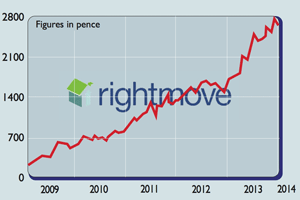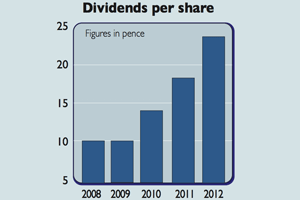Shares in focus: The Google of Britain's housing boom
Property website Rightmove has enjoyed tremendous success, says Phil Oakley. But can it deliver for shareholders?
Get the latest financial news, insights and expert analysis from our award-winning MoneyWeek team, to help you understand what really matters when it comes to your finances.
You are now subscribed
Your newsletter sign-up was successful
Want to add more newsletters?

Twice daily
MoneyWeek
Get the latest financial news, insights and expert analysis from our award-winning MoneyWeek team, to help you understand what really matters when it comes to your finances.

Four times a week
Look After My Bills
Sign up to our free money-saving newsletter, filled with the latest news and expert advice to help you find the best tips and deals for managing your bills. Start saving today!
Property website Rightmove has done well.Phil Oakley asks whether it can keep on delivering for shareholders.
Online property portal Rightmove has been a stunning success story. It has truly changed the way people look for somewhere to live at a time when other internet ventures promised, but failed to revolutionise markets.
Rightmove.co.uk, founded in 2000 at the height of the boom, has become the Google of the online property market. It has been so successful that it now ranks as one of the most popular websites in the country behind a handful of others, such as Facebook, eBay and Google itself.
MoneyWeek
Subscribe to MoneyWeek today and get your first six magazine issues absolutely FREE

Sign up to Money Morning
Don't miss the latest investment and personal finances news, market analysis, plus money-saving tips with our free twice-daily newsletter
Don't miss the latest investment and personal finances news, market analysis, plus money-saving tips with our free twice-daily newsletter
Its success has brought with it impressive profit growth and fantastic returns for shareholders. The business now has a stock-market valuation of £2.5bn. Its shares are very highly valued by the market, which implies that the company's profits will continue their stellar rise in the years ahead. The question is, can it keep on delivering or is this as good at it gets?
How the business has fared
The company's success is down to its technology, marketing and branding, which have made it very tough to compete with. It need make no heavy investment in assets, which has allowed it to make huge amounts of money.
A profit margin of 73% virtually unheard of in most businesses allows Rightmove to generate bucketloads of surplus cash to pay out to shareholders.
The company has proven very flexible in response to a changing property market. During the gloom and doom of a few years ago, when many of its estate-agency customers went out of business, it was still able to cut its costs and increase profit margins.
There's no doubt Rightmove has done a good job for its customers. Its site can generate many more potential buyers or tenants for a property than a local newspaper can. It's also kept adding new services, such as local valuation alerts or agent microsites (these are similar to eBay shops, allowing users to personalise their presence), which means it has been able to keep on increasing its prices.
It has also been able to profit from the government's Help to Buy scheme, which has caused the housing market to boom again by helping housebuilders promote their developments. In return, housebuilders are typically paying Rightmove 50% more per month than estate agents do.
Given the company's powerful market position and buoyant housing market it's no surprise that stock-market analysts expect Rightmove's profits to keep on rising by 20% per year. But storm clouds could be gathering on the horizon. In many markets, high profits attract competition and prices come down. Could Rightmove be vulnerable to this?
It seems that a growing number of estate agents are becoming concerned about the power of Rightmove and the prices that it charges. Five years ago, an estate agent's office was paying just over £300 per month for Rightmove to advertise its properties. That figure will probably be £600 in 2014. For many agents that's too much. They are worried that left unchecked they could be paying £1,000 per month in five years' time.
So, big agents such as Savills and Knight Frank have teamed up with Ian Springett (the founder of Primelocation.com) to form Agents' Mutual a rival portal that will be owned by the agents who advertise on it. It plans to launch later this year or in 2015 and it's rumoured it will charge around £400 per month, falling to £250 in five years.
Will this really damage Rightmove? Sure, reducing its fees to £400 or £250 would see much lower profits, but can a new entrant really build up the scale and branding of Rightmove quickly? Would agents really want to dump Rightmove? Would house hunters find it to be as good?
It's by no means certain. But what does seem clear is that Rightmove's business model could face a challenge over the next couple of years. If it can't keep on jacking up its prices then it may struggle to grow as the number of agents it is taking on isn't really changing. Help to Buy has also created something of a false market for property, which cannot go on indefinitely.
Should you buy the shares?
As good a business as Rightmove is, the risk of disappointment looks too high at the current price. Returns from dividends are very small as well, while the large sums of money being spent on buying back shares seem a poor return on shareholders' money.
Long-term shareholders might be content to stay on board, but we wouldn't be chasing the shares now.
Verdict: avoid
Rightmove (LSE: RMV)


Directors' shareholdings
Get the latest financial news, insights and expert analysis from our award-winning MoneyWeek team, to help you understand what really matters when it comes to your finances.
Phil spent 13 years as an investment analyst for both stockbroking and fund management companies.
-
 Last chance to invest in VCTs? Here's what you need to know
Last chance to invest in VCTs? Here's what you need to knowInvestors have pumped millions more into Venture Capital Trusts (VCTS) so far this tax year, but time is running out to take advantage of tax perks from them.
-
 ISA quiz: How much do you know about the tax wrapper?
ISA quiz: How much do you know about the tax wrapper?Quiz One of the most efficient ways to keep your savings or investments free from tax is by putting them in an Individual Savings Account (ISA). How much do you know about ISAs?
-
 Rightmove: Asking prices rise by 0.3%, but increase is lower than typical for October
Rightmove: Asking prices rise by 0.3%, but increase is lower than typical for OctoberOctober saw asking prices grow by £1,165 on average, Rightmove says, but the increase is far below the usual autumn bump as the property market braces for next month’s Budget.
-
 Three UK stocks for long-term growth
Three UK stocks for long-term growthUK Stocks Professional investor Nick Train picks three UK stocks to invest in the British boom.
-
 Rightmove: property asking prices hit record high
Rightmove: property asking prices hit record highNews Rising demand for top of the ladder home is boosting asking prices, Rightmove research shows. Is now a good time to sell a property?
-
 Rightmove will go wrong
Rightmove will go wrongFeatures Rightmove, the online property portal, is too pricey given the poor outlook for housing.